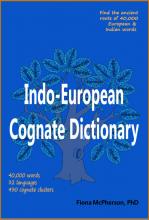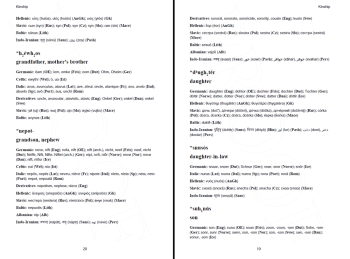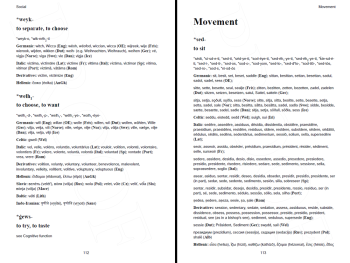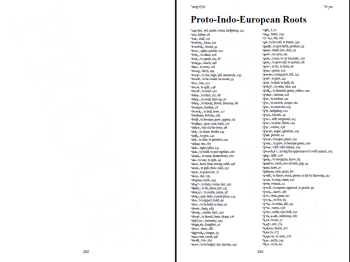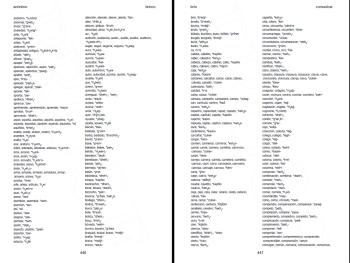English, along with many other languages, belongs to the Indo-European language family, meaning that member languages all descend from a single language (Proto-Indo-European), spoken thousands of years ago. The Indo-European language ‘tree’ has nine living branches, and this dictionary records words from 32 languages, covering eight of these branches (the ninth branch is Armenian, consisting solely of the Armenian language).
These languages are:
Germanic: English, Old English, Frisian, Dutch, German, Swedish, Danish, Norwegian, Icelandic, Norse
Celtic: Welsh, Irish
Italic: Latin, French, Italian, Spanish, Portuguese, Romanian
Hellenic: Ancient Greek, Modern Greek
Baltic: Lithuanian, Latvian
Slavic: Russian, Polish, Czech, Slovak, Macedonian
Albanian
Indo-Iranian: Sanskrit, Hindi, Persian, Pashto
Germanic and Romance languages are covered far more completely and deeply than other fruitful branches. Of the 40,000 words in the dictionary, 14,200 belong to the Germanic branch, and 17,600 to the Italic branch. Because of its influence on other languages, Ancient Greek has also been covered reasonably well, with 1400 words.
The purpose of this dictionary is to make it easy to find cognates — words that share the same linguistic root. Anyone learning a language closely related to their native one knows how much easier cognates are to learn, but in general they only recognize the glaringly obvious, for example, Spanish importante / English important; French authentique / English authentic; German Apfel / English apple; Dutch mixen / English mix; Iceland eyland / English island. But many, many others are not so obvious.
Did you know ineffable, infant, fate, fame, nefarious, confession, professor, and fabulous are all related? The original ancestor meant to speak. They’re also cognate with words such as cacophony, microphone, phonetic, and symphony, as well as words such as boon, ban, and banish. The first group comes through Latin, the second through Greek, and the third is Germanic.
The dictionary consists of two parts. The first part contains the pages for each Proto-Indo-European (PIE) word, showing cognates in the chosen languages plus various descendants and derivatives. These pages are arranged thematically, allowing you to browse or study. Search is enabled by the second part to the dictionary, which contains a separate index for each language, telling you where to find each word.
About this dictionary
Introduction
Abbreviations
Dictionary
People
Kinship
Pronouns
Body
- Head
- Limbs & Joints
- Torso & Organs
- Internal components
Bodily functions
Cognitive function
Emotion
Social
Movement
- Object motion
Construction & Production
- Tools
- Dwelling
- Mineral products
Farming
Flora & Fauna
- Trees
- Plants
- Mammals
- Reptiles
- Marine animals
- Birds
- Insects
- Animal products
Environment
- Sky
- Weather
- Terrain
- Fire
Time
Numbers & Wholeness
Directions
Basic adjectives
- Colours
Index of Proto-Indo-European Roots
Word Index
English
Old English
Frisian
Dutch
German
Norse
Norwegian
Swedish
Danish
Icelandic
Welsh
Irish
Latin
French
Italian
Spanish
Portuguese
Romanian
Ancient Greek
Greek
Russian
Polish
Czech
Slovak
Macedonian
Lithuanian
Latvian
Albanian
Sanskrit
Hindi
Pashto
Persian
Formats: Paperback, E-book (ePub, pdf)
Size: 545 pages; 2.7 Mb
Publisher: Wayz Press (March, 2018)
ISBN:
978-1-927166-41-3 (pdf)
978-1-927166-40-6 (ePub)
978-1-927166-38-3 (paperback)
